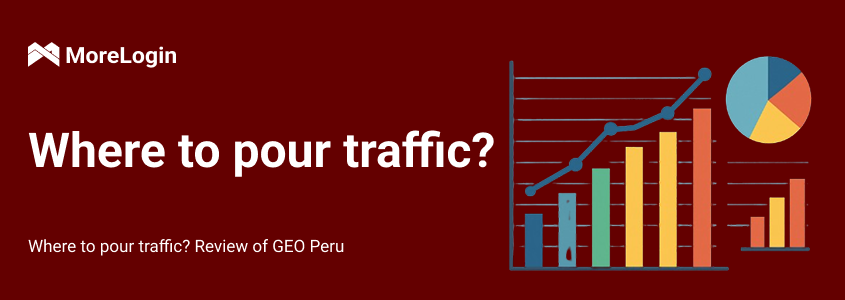
- Product

- Pricing
- Affiliate Program
- Use Cases
- Resource


Where to pour traffic? Today, we’ll talk about a country that consistently ranks well for cheap traffic and attractive conversion rates. With proper localization, Peru can become an excellent GEO for arbitrage. The country has a stable economic growth, increasing digitalization, and high user engagement. Meanwhile, competition in some verticals is still low. One of the tools that helps achieve effectiveness in this market is the anti-detect browser MoreLogin, which allows managing multiple accounts without risk of bans, maintaining the stability and scalability of ad campaigns.
The Republic of Peru is a country in western South America, stretching between the Pacific Ocean and the eastern foothills of the Andes. It's a land of rich cultural heritage, remnants of the Inca Empire, and a dynamically growing digital sector. And most importantly — it’s a market where you can scale stably with relatively low traffic investment.
Area — 1,285,216 km²
Borders — Ecuador, Colombia, Brazil, Bolivia, and Chile
Capital — Lima (population over 9.5 million)
Other major cities — Arequipa, Trujillo, Chiclayo, Cusco
Total population — about 34 million
Median age — 31 years
Language — official language is Spanish; Quechua and Aymara are also recognized
Most of the population lives along the coast, particularly in Lima and its surrounding areas. The inland regions are less populated but more responsive to advertising — especially in health, e-commerce, and info product verticals.
Peruvians are open, emotional, and rather trusting, especially if a brand or offer resonates with themes of care, family, and authority. These traits should be leveraged in creatives.
Key characteristics:
Family values and respect for elders
Peruvians value family traditions. Multiple generations often live under one roof. Caring for loved ones is a strong emotional trigger.
Respect for authority
People tend to trust government institutions, doctors, and uniformed personnel. Featuring “medical” figures or referring to “government programs” (within reason) can significantly increase conversion.
Emotionality
Like many Latin Americans, Peruvians are impulsive buyers. Visuals focused on emotion — joy, sympathy, concern for health — perform well.
Financial prudence
Despite economic growth, people are cautious with spending. They respond well to promotions, discounts, installment plans, and “buy now – pay later” schemes.
Public healthcare is formally accessible, but its quality often falls short — overcrowded hospitals, outdated equipment, and staff shortages reduce trust in the system. Private healthcare is better but costs $60–80 per visit, making it unaffordable for many.
As a result, Peruvians often turn to alternative treatments. Traditional and home remedies passed down through generations, and help from local healers are popular. Many people are open to using supplements and pseudo-medical products, especially those that promise quick results or disease prevention.
To build trust in health-related offers, creatives must include recognizable authority figures — a doctor in a white coat, a caring mother, or a schoolteacher. These characters evoke feelings of safety and reliability, especially concerning personal or family health.
Older generations are active internet users, especially on Facebook and messaging apps. The pension system is mixed, and not everyone receives a sufficient retirement income — which makes offers related to passive income, investing, and wellness particularly appealing.
Tapping into real, relatable issues in creatives not only triggers emotional responses but also builds trust in the product. Peruvians respond strongly to themes that affect their daily lives and make them feel that a product or service solves a real problem.
Environmental concerns
In cities like Lima, air pollution exceeds safe levels, particularly in industrial and densely populated areas. This causes chronic respiratory issues, allergies, and anxiety. Health or protection-focused offers gain traction here.
Education quality
In rural and remote regions, schools are underfunded, lacking teachers and materials. Parents worry about their children’s future. Educational courses, online schools, and even simple learning products are well-received — especially when framed around accessibility and value.
Healthcare access
Public clinics are overcrowded with long queues and poor service. Private healthcare is too expensive. Thus, offers focused on prevention, home remedies, natural products, and dietary supplements work well — as long as they emphasize care and clear benefits.
Economic instability
Youth face unemployment, gig work, and unstable income. Offers related to learning, side jobs, freelancing, or low-entry investment opportunities attract interest. People look for risk-free, low-cost ways to earn.
Health issues: obesity and diabetes
These are growing problems due to diet changes, urban lifestyles, and low physical activity. Offers related to weight control, nutrition, blood sugar management, and lifestyle improvement resonate across age groups — especially when emphasizing care for loved ones and simple, accessible solutions.
Focus on family values and health care
Avoid harsh criticism of authorities or religion — Catholicism is still strong
Don’t use gender stereotypes — equality and feminism are gaining ground
Simplify your messaging — average literacy and digital literacy are lower than in Chile
Test video formats and stories — especially on Facebook and TikTok
Peru is an underrated but promising GEO with huge potential. With the right offer adaptation and creatives, you can achieve excellent ROI at a low cost per lead. The key is understanding the local audience, using effective emotional triggers, and being willing to test non-standard approaches.
If you’re looking to explore fresh combinations with minimal competition — Peru is definitely worth serious consideration.